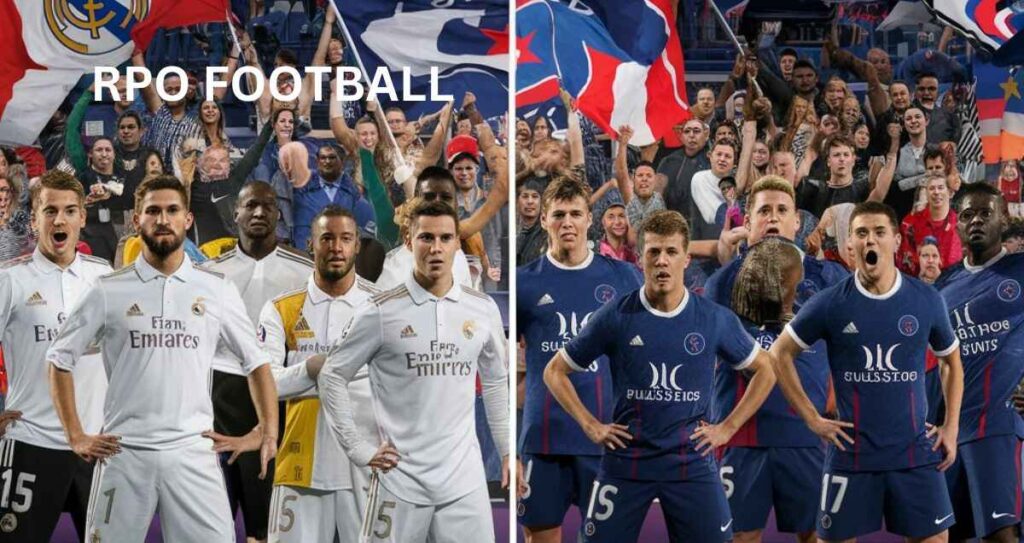What Is RPO Football? stands for Run-Pass Option, an offensive strategy where the quarterback decides whether to hand off the ball or pass it based on how the defense reacts. This dynamic play gives offenses greater flexibility, making it tough for defenders to predict the next move.
Ever wonder how some offenses seem impossible to stop? What Is RPO Football? forces defenders to guess—should they defend the pass or the run? This uncertainty creates openings for big plays and ensures the offense stays unpredictable.
The RPO concept blends both running and passing plays into one, giving quarterbacks multiple options in a single snap. Depending on the defense’s response, they can either hand off to the running back or throw a pass. This makes RPO football a highly efficient strategy, especially against aggressive defenses.
How the RPO Works: Mechanics of the Play

The RPO play involves a blend of running and passing mechanics, giving the offense multiple options depending on how the defense lines up or reacts. Here’s a step-by-step breakdown of how it works:
- Pre-Snap Read:
- Before the ball is snapped, the quarterback scans the defense to identify weaknesses or mismatches. If linebackers appear to be cheating toward the run, the quarterback may lean toward passing.
- The Mesh Point:
- The quarterback and running back meet at the mesh point, where the quarterback can either hand the ball off or pull it back based on how the defenders react.
- Reading the Key Defender:
- The quarterback watches a specific defender (often a linebacker or safety). If that player commits to stopping the run, the quarterback pulls the ball and throws a pass. If the defender backs off to cover the pass, the ball is handed to the running back.
- Executing the Play:
- The play develops in real-time, and the offensive line blocks as if it’s a running play, adding to the defense’s confusion.
Benefits of Using the RPO
The RPO system provides numerous tactical advantages, making it a go-to strategy for many offenses today. Here are the key benefits:
- Creates Defensive Confusion: Defenders are forced to decide quickly whether to stop the run or cover the pass, making them more prone to mistakes.
- Maximizes Mismatches: The quarterback can exploit weaknesses in the defense based on real-time observations.
- Improves Offensive Flexibility: With multiple options on the same play, teams can quickly adapt to changing game situations.
- Keeps Defenses Honest: Defenses cannot commit to stopping the run or pass without risking being wrong.
- Reduces Predictability: Since every RPO looks the same initially, it becomes harder for defenses to anticipate the offense’s next move.
Key Roles and Positions in the RPO
Every position plays a crucial role in executing RPO plays seamlessly. Here’s how:
- Quarterback: Makes the key decision to either hand off or pass the ball.
- Running Back: Runs aggressively at the mesh point, regardless of whether they receive the handoff.
- Offensive Line: Blocks as if it’s a running play, preventing defenders from reading the play.
- Wide Receivers: Must be ready to catch quick passes if the quarterback decides to throw.
- Tight Ends: Often used to create mismatches in short passing routes.
Types of RPOs
There are several variations of RPO plays designed to keep defenses on their heels. The most common types include:
- Pre-Snap RPO:
- The quarterback makes the decision before the snap, based on the defense’s alignment.
- Post-Snap RPO:
- The quarterback reads a specific defender after the snap and decides to run or pass accordingly.
- Triple Option RPO:
- The offense has three options: a handoff, a quarterback keeper, or a quick pass.
RPO vs Play Action: What’s the Difference?
At first glance, RPO plays and play-action passes may look similar, but they serve different purposes.
| Feature | RPO | Play Action |
|---|---|---|
| Decision Timing | Made during the play | Decided before the snap |
| Play Structure | Blend of run and pass options | Fakes a run to set up a pass |
| Key Objective | Adapt to defensive movement in real-time | Trick the defense into expecting a run |
Famous Teams Known for Running RPO Offense
Several teams have mastered the RPO concept and integrated it into their offensive schemes:
- Philadelphia Eagles: The Eagles used RPOs extensively during their 2017 Super Bowl-winning season.
- Kansas City Chiefs: Patrick Mahomes and Andy Reid have used RPOs to keep defenses guessing.
- Oklahoma Sooners: A pioneer in college football RPOs, the Sooners use them to maximize their dynamic offense.
Case Study: The Role of RPO in the Philadelphia Eagles’ Success
In 2017, the Philadelphia Eagles won the Super Bowl, and RPO plays were a big reason behind their offensive success. Under head coach Doug Pederson, the Eagles integrated RPO concepts into their game plan, allowing quarterback Nick Foles to make quick decisions based on defensive alignment. This strategy kept defenses off-balance throughout the playoffs and helped the Eagles defeat the New England Patriots in the Super Bowl.
How Defenses Counter the RPO
Defensive coordinators have developed strategies to counter the threat of the RPO. Some of the most effective countermeasures include:
- Assignment Football: Defenders stick to specific assignments, ensuring that someone covers the pass while another player stops the run.
- Zone Coverage: Using zone defense helps limit passing options and reduces the effectiveness of quick passes.
- Press Coverage: Jamming receivers at the line disrupts the timing of RPO plays.
- Delayed Blitzes: Sending a late blitz forces the quarterback to make quicker decisions, increasing the chance of mistakes.
Conclusion
Now that you understand What Is RPO Football?, it’s clear why this strategy has become so popular at every level of the game. The What Is RPO Football? offers unmatched flexibility, allowing offenses to react to defenses in real time and keep them guessing throughout the game. With teams like the Eagles and Chiefs showcasing its effectiveness, RPOs are here to stay as a staple of modern football.
Whether you’re a player looking to improve your RPO skills or a fan trying to understand the mechanics, mastering the RPO concept provides deep insights into how today’s offenses operate. As defenses continue to evolve, the battle between RPO offenses and defensive schemes will remain one of football’s most intriguing dynamics.
David Mark is a passionate sports writer and the voice behind SportsJourney. With a deep love for athletics and extensive knowledge across various sports, David delivers engaging content and expert analysis. His articles cover everything from game strategies and player profiles to sports news and commentary, providing readers with insightful and exciting perspectives on the world of sports.

